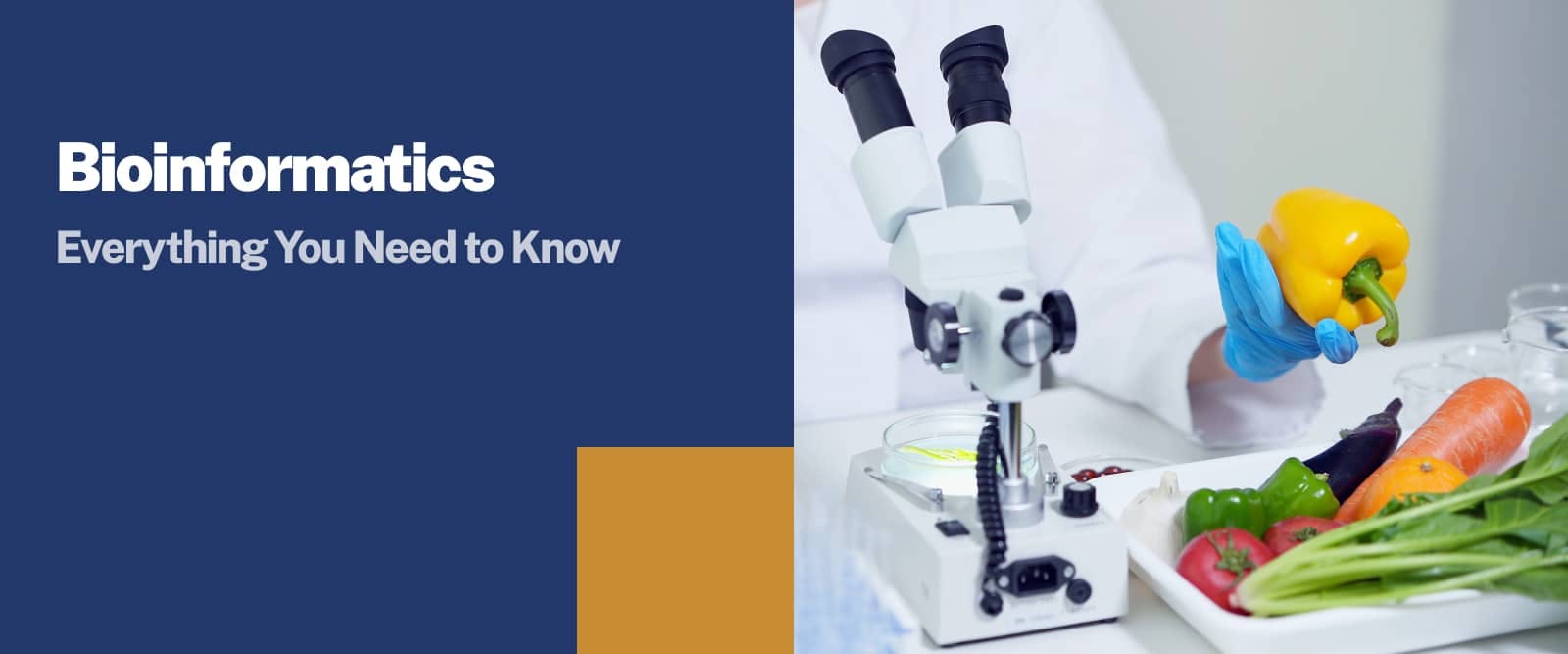5800 students unlocked their dream jobs with UG/PG programs in top colleges. Apply Now!
Bioinformatics is the intersection of biology and computer science that combines data analysis, algorithms, and information technology to understand, interpret and store vast amounts of biological data. It is an increasingly important field in India, with numerous advancements in drug discovery, agricultural biotechnology, and genomics. A career in bioinformatics can offer opportunities in biotech companies, research institutes, and IT companies. With its growing importance, bioinformatics courses in India offer a valuable asset for those interested in the biotechnology industry.
If you want to get into this field, we suggest you get a bachelor of technology degree from a reputed college. But before that, you will need some other information and detail about the bioinformatics meaning, objectives, education and training, applications and career options.
[Also read: scope of biomedical engineering]
What is Bioinformatics?
Bioinformatics is a domain that uses computers, algorithms, and statistics to process, analyse, and store biological data. It includes data from DNA sequencing, protein analysis, and many other experiments. The data is generated from various sources, including high-throughput sequencing technologies and sophisticated laboratory techniques. The volume of data generated can be overwhelming and requires advanced computational tools, engineering skills and algorithms to process and analyse.
Objectives Of Bioinformatics
The ability to process and analyse large amounts of biological data is critical in today's rapidly advancing biotechnology industry.
- Storing, managing, and analysing large amounts of biological data - Bioinformatics provides the tools and resources necessary to store, manage and analyse vast amounts of biological data.
- Developing computational tools and algorithms - Bioinformatics develops new and innovative computational tools and algorithms to process and analyse biological data, making sense of the vast amounts of information generated by modern biology experiments.
- Guiding further research through simulations and predictions - The importance of bioinformatics in India is realised in different domains, such as the scope of biomedical engineering, as it helps create digital representations of biological systems, enabling simulations and predictions that can guide further research.
Education and Training in Bioinformatics in India
After having discussed the bioinformatics definition and objectives, it is important to know the education and training requirements and the bioinformatics course details.
- Bachelor's Degree - Many universities in India offer Bachelor Of Technology in Bioinformatics, which provides a foundation in the field and practical experience working with bioinformatics tools and technologies.
- Master's Degree - A Master's degree in Bioinformatics course provides more advanced training in the field and can lead to careers in academia or industry.
- PhD - A PhD in Bioinformatics provides advanced training in the field and is necessary for those interested in pursuing a career in research.
B.Tech Bioinformatics is a 4-year undergraduate degree program in India that combines the principles of biology, computer science, and mathematics to enhance the knowledge about the basics of Bioinformatics. During the course of their studies, students will learn B.Tech subjects that include genetics, molecular biology, computer science, and statistics. They will also learn to use advanced computer software and databases to analyse biological data and make predictions about biological systems.
Eligibility in Bioinformatics
The eligibility criteria for B.Tech in Bioinformatics may vary between the colleges, but the general standards are as follows:
- Educational Qualification - Candidates must have passed their 10+2 or equivalent examination from a recognised board with Physics, Chemistry, and Mathematics as compulsory subjects. Some colleges may also accept candidates with Biology as one of the subjects.
- Minimum Marks - Candidates must have secured a minimum aggregate score of 50% in their 10+2 examination. The minimum marks required may vary between the colleges.
- Entrance Examination - Candidates must clear the entrance examination to be eligible for admission. There are national-level entrance examinations such as the JEE Main, JEE Advanced, etc. In addition, some colleges conduct entrance examinations for admission to their B.Tech in Bioinformatics course, such as the VITEEE.
Admission Process in Bioinformatics
The admission process for B.Tech in Bioinformatics may vary between colleges, but generally, it involves the following steps:
- Register by filling out the application form of the respective institution.
- Appearing for the entrance exam.
- The institution declares the merit list.
- Counselling and allocation of seats.
- The selected candidates can provide their original documents and get them verified.
- Paying the applicable fees.
Syllabus For B.Tech Bioinformatics
The syllabus for B.Tech in Bioinformatics may vary between the colleges. However, some of the general subjects covered in the 4 years are as follows:
|
First Year |
Second Year |
|
|
|
Third Year |
Fourth Year |
|
|
Applications Of Bioinformatics
The scope of bioinformatics is vast and continues to expand as new technologies and techniques are developed.
- Drug discovery and development - Bioinformatics is used in drug discovery and development by analysing large amounts of data to identify new drug targets and evaluate drug safety and efficacy. Furthermore, bioinformatics helps support personalised medicine and precision medicine by analysing large amounts of data to determine individualised treatments.
- Agricultural biotechnology and food production - Bioinformatics helps to improve agricultural biotechnology and food production by analysing genetic data to determine growth characteristics and resistance to pests and diseases.
- Genetic studies - The concept of bioinformatics is used to analyse and interpret genetic data, identify mutations and genetic disorders, and understand the function of genes.
- Protein analysis - Bioinformatics is used in protein analysis to understand the structure and function of proteins, predict protein interactions and evaluate protein stability.
- Genome assembly and annotation - Bioinformatics helps in genome assembly and annotation by processing and analysing large amounts of data from genome sequencing experiments to determine the complete genome sequences of organisms.
- Evolutionary studies - Bioinformatics is used in evolutionary studies to analyse and interpret data on the evolution of species and populations.
- Environmental studies - Bioinformatics is used in environmental studies to analyse and interpret large amounts of data to understand the impacts of environmental factors on organisms.
- Gene Therapy - Gene therapy is a medical field involving using genetic material to treat or cure diseases. Bioinformatics plays a critical role in gene therapy by developing processes to identify the specific genes responsible for particular diseases, understanding the mechanisms of gene function, and developing new and innovative gene therapy treatments.
- Biomedical engineering - Biomedical engineering is a branch of engineering that deals with the application of engineering principles and techniques to medical and biological systems. It combines engineering, biology, and medical science to develop new technologies, devices, and systems to improve human health. Biomedical engineers work in various areas, including medical devices and equipment design, implant design and materials, rehabilitation engineering, and biotechnology. They also play a critical role in developing new diagnostic and therapeutic tools and in the design and development of new drugs and therapies with the aid of bioinformatics.
Career Opportunities in Bioinformatics in India
Bioinformatics graduates have a wide range of job opportunities in biotechnology, pharmaceuticals, healthcare, and academic research.
- Research scientist - Research scientists are responsible for conducting experiments, collecting and analysing data, and developing new theories or hypotheses. The average salary is ₹8.44 lakhs.
- Bioinformatics analyst - A bioinformatics analyst is responsible for developing algorithms, designing experiments, analysing and interpreting data, and creating databases to store biological data. The average salary for a Bioinformatics Analyst in India is ₹5.47 lakhs.
- Bioinformatics Software Developer - A bioinformatics software developer is a professional who develops software applications to support research in the field of bioinformatics. The average salary for a Bioinformatics Software Developer in India is ₹10.5 lakhs.
- Biostatistician - A Biostatistician is a professional who applies statistical methods to biological and medical data to extract meaningful insights. The average salary of a biostatistician is ₹8.90 lakhs.
Conclusion
Bioinformatics has become an increasingly important field in India, with numerous opportunities for growth and advancement. With the continued development of new technologies and increasing demand for experts in the field, education from reputed education services providers such as Sunstone and a career in bioinformatics can be both rewarding and fulfilling. Whether you are interested in drug discovery, agriculture, genomics, or any other area of biotechnology, a background in bioinformatics is a valuable asset.
FAQ - Bioinformatics
Who coined the term bioinformatics?
Paulien Hogeweg and Ben Hesper first coined the term Bioinformatics in 1970. Paulien Hogeweg was a Dutch complex system researcher and theoretical biologist.
Is bioinformatics a good career?
Bioinformatics offers a good and prosperous career path in India and abroad with salary packages ranging from ₹6 LPA to ₹51 LPA.
HELP
Take the first step towards your dream job.
ABOUT THE AUTHOR


